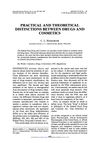
Search
for
Sort by
Research
30-60 / 1000+ results

research Changes in Murine Hair with Dietary Selenium Excess or Deficiency
Too much or too little selenium in the diet can cause hair loss and graying in mice.

research Microbiome in the Hair Follicle of Androgenetic Alopecia Patients
Hair loss patients have different microbes in hair follicles, possibly affecting hair loss.

research Practical and Theoretical Distinctions Between Drugs and Cosmetics
The article concludes that products can affect the body without being drugs as long as they don't claim to treat or prevent diseases, except for cosmetic sunscreens.

research Wound Healing Impairment in Type 2 Diabetes Model of Leptin-Deficient Mice: A Mechanistic Systematic Review
Leptin-deficient mice, used as a model for Type 2 Diabetes, have delayed wound healing due to impaired contraction and other dysfunctional cellular responses.

research Redox-Directed Interventions Targeting Skin Photodamage
Some treatments can improve skin's defense against damage, but overuse may cause other skin problems.
research Sebum Free Fatty Acids Enhance the Innate Immune Defense of Human Sebocytes by Upregulating Beta-Defensin-2 Expression
Free fatty acids in sebum boost skin's defense against acne by increasing antimicrobial peptides.

research Structure and Function of the Skin
The document concludes that the skin is a complex organ providing protection, sensation, and healing, with challenges in treating conditions like itchiness.

research Impact of Type 2 Cytokines on the Keratinocytes-Staphylococcus Aureus Interaction
Type 2 cytokines IL-4 and IL-13 increase skin's vulnerability to Staphylococcus aureus, which could be important for treating atopic dermatitis.

research Multi-Faceted Enhancement of Full-Thickness Skin Wound Healing by Treatment with Autologous Micro Skin Tissue Columns
Using micro skin tissue columns improves skin wound healing and reduces scarring.

research Deficiency of the Human Cysteine Protease Inhibitor Cystatin M/E Causes Hypotrichosis and Dry Skin
Not having enough cystatin M/E protein causes less hair growth and dry skin.

research Understanding the Functional Contribution of Dermal Stem Cells to Hair Follicle Regeneration and Skin Wound Healing
Dermal stem cells help regenerate hair follicles and heal skin wounds.

research The Immune Functions of Keratinocytes in Skin Wound Healing
Keratinocytes help heal skin wounds by interacting with immune cells and producing substances that kill pathogens.

research The Role of Leptin in Selected Skin Diseases
Leptin affects skin and hair health and may worsen some skin conditions, but more research is needed to understand its full impact.
research Soy Protein Containing Isoflavones Improves Facial Signs of Photoaging and Skin Hydration in Postmenopausal Women: Results of a Prospective Randomized Double-Blind Controlled Trial
Soy protein with isoflavones reduces wrinkles and improves skin hydration in postmenopausal women.
research Understanding Type 3 Innate Lymphoid Cells and Crosstalk with the Microbiota: A Skin Connection
Type 3 Innate Lymphoid Cells help maintain skin health and balance, and are involved in skin diseases and healing.

research Let Astaxanthin Be Thy Medicine
Astaxanthin is a safe antioxidant that may improve heart, skin, eye health, and physical performance, and help manage chronic diseases.

research New Pharmaceutical Concepts for Sebaceous Gland Diseases: Implementing Today's Pre-Clinical Data into Tomorrow's Daily Clinical Practice
New treatments for skin conditions related to the sebaceous gland are being developed based on current research.
research Enhancing Skin Anti-Aging Through Healthy Lifestyle Factors
Healthy lifestyle changes can significantly improve skin health as you age.
research Matricellular Proteins in the Homeostasis, Regeneration, and Aging of Skin
Special proteins are important for skin balance, healing, and aging, and affect skin stem cells.

research Editors' Picks
Activin increases skin tumor formation, skin Tregs help hair growth, lymph-node removal doesn't improve melanoma survival, cells can revert to stem cells in wound healing, and skin bacteria produce peptides that may treat infections.

research Metabolic Pathways of Eicosanoids: Derivatives of Arachidonic Acid and Their Significance in Skin
Eicosanoids are crucial for skin health, and targeting their pathways may help treat skin conditions.

research Stimulation of the Follicular Bulge LGR5+ and LGR6+ Stem Cells with the Gut-Derived Human Alpha Defensin 5 Results in Decreased Bacterial Presence, Enhanced Wound Healing, and Hair Growth from Tissues Devoid of Adnexal Structures
Human alpha defensin 5 helps heal wounds, reduce bacteria, and grow hair on burned skin.

research Dermal Adipose Tissue Secretes HGF to Promote Human Hair Growth and Pigmentation
Fat under the skin releases HGF which helps hair grow and gain color.
research Quercetin-Loaded Biocomposites for Wound Healing Applications
Quercetin can help heal wounds better if its skin absorption is improved.

research Plant Cell Culture as Emerging Technology for Production of Active Cosmetic Ingredients
Plant cell culture is a promising method for creating sustainable and high-quality cosmetic ingredients.

research Studies on the Proteome of Human Hair: Identification of Histones and Deamidated Keratins
Human hair contains diverse proteins, including keratins and histones, which could help assess hair health and aging.

research The Epidermal Vitamin D System and Innate Immunity: Some More Light Shed on This Unique Photoendocrine System?
Vitamin D made by the skin plays a role in immune defense and skin health, and more research is needed to understand its full effects.

research Skin Shedding and Tissue Regeneration in African Spiny Mice (Acomys)
African spiny mice can regenerate skin, hair, and cartilage, but not muscle, and their unique abilities could be useful for regenerative medicine.
research Hair Melanocytes as Neuro-Endocrine Sensors—Pigments for Our Imagination
Hair melanocytes help the skin respond to stress and regulate hair pigmentation.